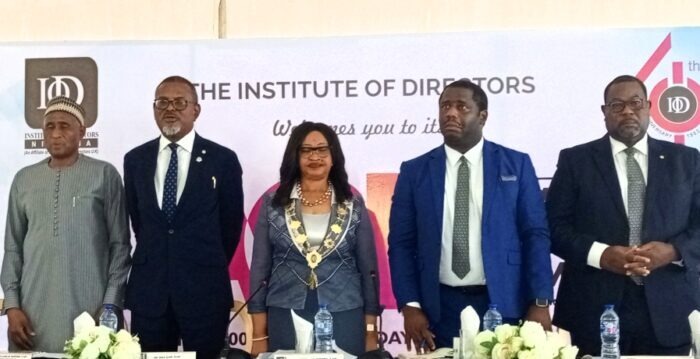By Rukayat Moisemhe
The Institute of Directors Nigeria (IoD Nigeria), a governance institute and promoter of ethical professional standards in Nigeria, has elected Alhaji Tijjani Borodo as its President and Chairman of Governing Council.
Borodo emerged as president during an election at the institute’s 39th Annual General Meeting (AGM) on Thursday in Lagos.
Mr Dele Alimi, Director-General, IoD, Nigeria, said Borodo would steer the ship of the affairs of the institute for the next two years.
This, he said, followed the expiration of the tenure of office of Dr Ije Jidenma, having served the institute in the same capacity for two years.
“Alhaji Borodo, Fellow of the institute, is a distinguished lawyer and the pioneer Company Secretary of FBN Holdings Plc., and an astute boardroom executive who served the institute previously in various capacities.
“Indeed, we are very pleased as he assumes the role of President of IoD Nigeria.
“As a previous office holder and council member of the institute, he had brought his extensive knowledge and experience to bear and has provided inspirational leadership and direction for the success of the Institute.
“His emergence will enhance the institute’s role as the leading corporate governance advocate, promoting sound ethical standards,” he said.
Outgoing president, IoD, Dr Ije Jidenma, in her remarks, said Nigeria must combat corruption and engender economic development.
Jidenma said this could be achieved via the strengthening of its institutions, promotion of transparency and accountability, and enforcement of anti-corruption laws.
She noted that in 2022, Nigeria experienced the repercussions of the global economy due to its economic fragility which exacerbated the challenges the country already faced.
This development, Jidenma added, was due to the country’s heavy reliance on crude oil for foreign exchange earnings, continuous currency depreciation, high inflation and unemployment rates and insecurity.
She said that corruption remained a big elephant in the room and maybe the greatest challenge hindering development in Nigeria.
She also stated the need for the country to implement sustainable and climate-smart policies to address the effects of climate change, which was a global threat.
“Addressing these developmental challenges requires cooperation and collaboration among the government, private sector, civil society, and development partners.
“With concerted efforts, Nigeria can overcome these challenges and achieve sustainable economic growth and development in the years ahead,” she said.
Jidenma also called for the adoption of a new governance model prioritising the knowledge and competence of both political leaders and the electorate.
This, she said, was critical to tackle governance failure and address systemic risks such as election fraud, terrorist attacks, herder-farmer conflict, armed banditry, and police brutality.
“To navigate these challenges, the country needs a revamped governance system that is based on the expertise and education of its leaders and voters.
“Continuing with the current system will only exacerbate the deterioration of public trust, seeing that corruption in governance is a major issue and undermines trust in the government,” she said.
On the development of the institute, the outgoing IoD president said her tenure had largely implemented the IoD five-year strategic plan hinged on five pillars.
“In 2022, our institute maintained its focus on delivering value to members and other stakeholders.
“We stepped up our attraction of new members and enhanced our services for the current ones.
“Through our effective management and engagement of existing members across our branches and zones, we have been able to improve our membership base as we inducted 428 new members in 2022,” she said.
Prince Austin Enajemo-Isire, Honorary Treasurer, IoD, said that despite the challenges which ravaged national and world economy in 2022, IoD recorded a surplus of N226.73 million.
This, he said, represented an increase of 52 per cent over the preceding year results of N148.83 million
Enajemo-Isire added that the institute’s total assets as at Dec. 31, 2022 was N3.12 billion, representing an increase of 11 per cent over the 2021 figure of N2.8 billion.
“The achievement was attributed majorly to improved contributions from membership, training and investment income and also as a result of new acquisitions and value added to the institute.
“The institute continues to prepare its accounts in line with IFRS standards.
“In line with the foregoing, the financial statements and reports of the institute represent a true and fair financial position and activities for the year ended December 2022,” he said. (NAN)(www.nannews.ng)
============
Edited by Olawunmi Ashafa

